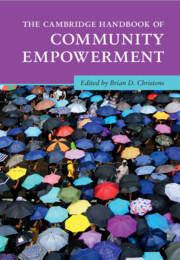‘While a lot of lip service is paid to the idea of community empowerment, this collection brings concrete, granular, and instructive examples, grounded in a common framework. It encompasses a wonderfully diverse collection of cases and contributors, spanning a range of pathways for action.’
John Gaventa - Institute of Development Studies, University of Sussex
‘This handbook provides a trenchant set of perspectives and clarifying examples about community empowerment, making it a vital read for anyone trying to understand how empowerment actually works.’
Hahrie Han - SNF Agora Institute, Johns Hopkins University
‘This comprehensive handbook is a definitive reference for scholars, practitioners, and students who aim to understand the theory of, and contribute to, power building in diverse types of communities and settings.’
Kei Kawashima-Ginsburg - Tisch College of Civic Life, Tufts University
‘Christens’ pitch perfect and refreshingly accessible volume explores community power building and engagement both deeply and broadly. Clear theoretical understandings of the pathways from community power to health, and a wealth of ‘real world’ case studies in a wide range of settings, make the book a standout for researchers and practitioners - one deeply needed in today’s troubling times.’
Meredith Minkler - School of Public Health, University of California, Berkeley
‘A tremendous scholarly achievement. Christens brings together an outstanding collection of papers to present cutting-edge research, demonstrating the ways in which individuals and groups can gain greater control over issues that concern them to improve public health and wellbeing. We all know that issues, such as inequalities in health, income, education, and opportunities for civic participation, are having devastating effects on people’s lives - but what, concretely, can be done? This book provides specific strategies and tactics that people can use to address the root causes of social and health problems in their communities.’
N. Andrew Peterson - Rutgers Center for Prevention Science, Rutgers University
‘This is a tour de force for community development and scholars interested in networks for social impact. The volume builds on the insights of Christens’ ecological model of community power and empowerment. The chapters demonstrate the model’s breadth of application from organizing and community action to enterprise models of empowerment.’
Michelle Shumate - School of Communication, Northwestern University



